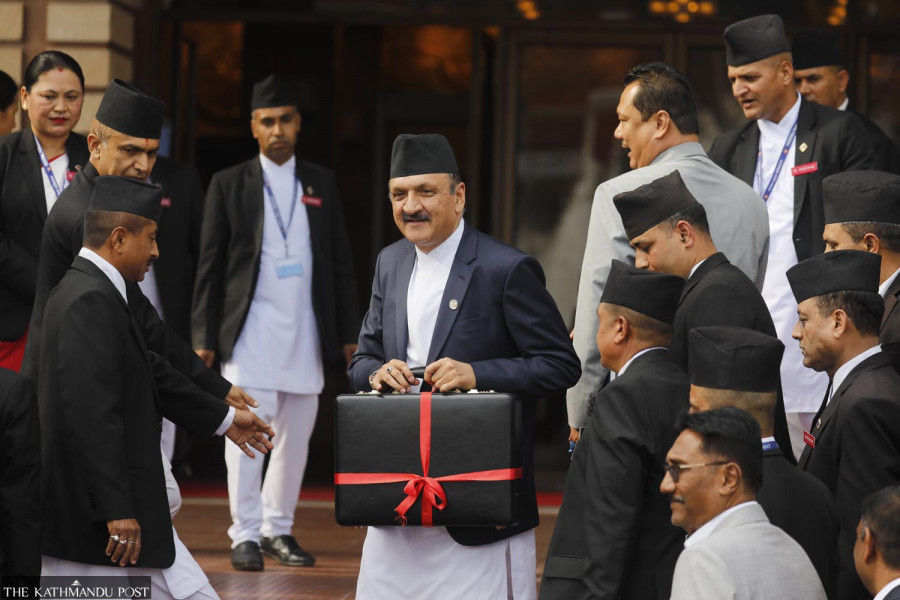National
Discontent with budget rife, lawmakers seek a revision
Ruling parties are also unhappy with disproportionate allocations to some districts at the expense of others.
Post Report
As calls are growing within the ruling parties to amend the annual budget of 2023-24, it has simultaneously triggered a debate as to what ramifications it would have if the budget keeps getting amended every year.
Vice Chairman of the ruling CPN (Unified Socialist) Rajendra Pandey has publicly warned his party chair Madhav Kumar Nepal not to allow the budget to pass without amendment.
“We will not allow endorsing the budget in its current form,” said Pandey, reiterating his earlier stance. “I have also made this clear to the party chairman.”
Pandey has many reservations about the budget. “There is no concrete plan on how to address the crisis being faced by the national pride projects. The capital expenditure is low, the government's treasury is not in good shape, national pride projects are facing financial crisis, north-south corridor roads are not getting enough funds, and several other projects related to drinking water and bridges are also suffering from funds crunch,” said Pandey.
The CPN (Unified Socialist) is one of the key partners of the Pushpa Kamal Dahal-led government.
Besides Pandey, Chairman of the Janamat Party Chandra Kant Raut also demanded an amendment to the budget. “If the budget is not amended, we won’t allow its endorsement by Parliament,” Raut said on Monday while addressing a parliamentary committee. “If the budget does not meet the aspirations of the lawmakers, the ruling parties themselves won’t be ready to pass the budget.”
Essentially, there is a major discontentment over the distribution of the budget in various districts and lawmakers have alleged that a huge amount of budget has been disproportionately allocated in Gorkha, Dadheldhura, Nuwakot, the home districts or constituencies of Prime Minister Pushpa Kamal Dahal, Nepali Congress President Sher Bahadur Deuba and Finance Minister Prakash Sharan Mahat. Also, huge amounts have been allocated to the constituencies of some key ministers.
“Budget for as many as 26 road projects has been allocated in Bhojpur district while in my district, there is just a single road project. How come the tourism minister can allocate such a huge number of roads projects in his district? Is this not a monopoly? Should not the budget be distributed as per the principle of proportional distribution?,” asked Ram Hari Khatiwada, a Nepali Congress lawmaker from Okhaldunga. Sudan Kirati, is the minister for Culture, Tourism and Civil Aviation, who was elected from Bhojpur.
Similarly, Minister for Urban Development Sita Gurung is facing charges of monopoly in the budget by only focusing on Terhathum, Panchthar and Taplejung districts.
“How can we say this budget is justifiable when Nuwakot, Dadheldhura and Gorkha districts have received more than eight, six and four times more budgets, respectively, than the previous years. The distribution of projects, programmes and funds are leader-centric. Funds have not been allocated proportionally, so I am in favour of amending the budget,” said Khatiwada.
Several other lawmakers and leaders of the ruling parties have also urged the prime minister to amend the budget. The prime minister is positive about amending the budget, but Finance Minister Prakash Sharan Mahat is dead against any revision, sources say.
“There won’t be any revision,” a leader close to Mahat said. “If any lawmaker has any concerns, they will be addressed after the budget is passed. Not a single digit or sentence is going to be amended before the passage of the budget by parliament.”
Finance Minister Mahat has been heard telling party leaders that some adjustments to the projects and programmes can be made after the budget is approved by the House, but before that, it cannot be amended.
During Monday’s meeting of the parliament’s Infrastructure Development Committee, Raut said the committee should forward a proposal for amending the budget. “We should recommend an amendment no matter whether they heed it or not. As members of the House panel, it is our duty to recommend to the government a budgetary amendment and we can forward some suggestions too. The minister should listen to the grievances of the lawmakers. The position of the minister is not permanent, so the finance minister should stop being adamant,” said Raut.
Raut also gave some examples at the meeting. Sudurpaschim has received more than six times the budget for Madhesh Province. While the population of Madhesh Province is 6.1 million, Sudurpashcim has only a 2.6 million population.
“Those preparing a budget should be mindful of the principles like population, human development indexes and other indicators,” said Raut. “If the government does not listen, then the lawmakers have full authority to reject the budget.”
Former finance secretary Rameshore Khanal said the parliamentary regulations bar the government from modifying the budget, so if ruling parties want to amend the budget, first they have to change those regulations. “Changing the regulations will pave the way for amendment. then the government has to bring new acts related to the budget and allocations, including the red book. That is not a big deal, but if it becomes the trend in the future, then it will be disastrous,” said Khanal.
“The amendment only happens and is possible only in an advanced and matured democracy and parliamentary system, not in ours,” said Khanal. “But if budget amendment becomes a trend, then it will invite instability.”
Professor Achyut Wagle of Kathmandu University said that the budget bill cannot be amended.
“The budget is not a law, but a bill. If someone tables the amendment proposal in the House and that proposal is passed, then it means, the budget bill has failed, so in principle, the budget bill cannot be amended,” said Wagle, who is also a columnist for the Post.




 13.12°C Kathmandu
13.12°C Kathmandu













